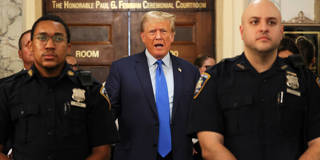Since the Colorado Supreme Court ruled, late last year, that Donald Trump can be disqualified from the 2024 presidential ballot, nearly everyone on the left and right has already decided that the ruling is obviously right or obviously wrong, respectively. In fact, both the law and the facts are unclear.
CHICAGO – This week, the US Supreme Court will hear oral arguments on Donald Trump’s appeal of the Colorado Supreme Court’s decision disqualifying him from the ballot for the 2024 presidential election. The Colorado court based its decision on Section 3 of the US Constitution’s Fourteenth Amendment, which bars from federal and state office anyone who, having sworn to uphold the Constitution, engages in insurrection. Nearly everyone on the left and right has already decided that the ruling is obviously right or obviously wrong, respectively. But the truth is that both the law and the facts are unclear, which means the Supreme Court justices’ political acumen will be tested like never before.
Start with the question of whether Trump engaged in “insurrection,” the resonant but undefined core of Section 3. One view is that he did so by orchestrating a mob attack on the Capitol on January 6, 2021, while Congress was trying to certify the election results. Another is that Trump gave aid and comfort to the insurrection by failing to call in the troops to quell it, and by waiting hours before telling his supporters to go home.
But it is not clear that he called for violence (“fight like hell” is an all-too-trite expression in the American vernacular), and it is unlikely that he expected the Capitol police to be overrun. Moreover, the president’s executive power is normally understood to be discretionary. It would be very unusual for a court to find that presidential inaction, as opposed to action, violated the constitution.

CHICAGO – This week, the US Supreme Court will hear oral arguments on Donald Trump’s appeal of the Colorado Supreme Court’s decision disqualifying him from the ballot for the 2024 presidential election. The Colorado court based its decision on Section 3 of the US Constitution’s Fourteenth Amendment, which bars from federal and state office anyone who, having sworn to uphold the Constitution, engages in insurrection. Nearly everyone on the left and right has already decided that the ruling is obviously right or obviously wrong, respectively. But the truth is that both the law and the facts are unclear, which means the Supreme Court justices’ political acumen will be tested like never before.
Start with the question of whether Trump engaged in “insurrection,” the resonant but undefined core of Section 3. One view is that he did so by orchestrating a mob attack on the Capitol on January 6, 2021, while Congress was trying to certify the election results. Another is that Trump gave aid and comfort to the insurrection by failing to call in the troops to quell it, and by waiting hours before telling his supporters to go home.
But it is not clear that he called for violence (“fight like hell” is an all-too-trite expression in the American vernacular), and it is unlikely that he expected the Capitol police to be overrun. Moreover, the president’s executive power is normally understood to be discretionary. It would be very unusual for a court to find that presidential inaction, as opposed to action, violated the constitution.